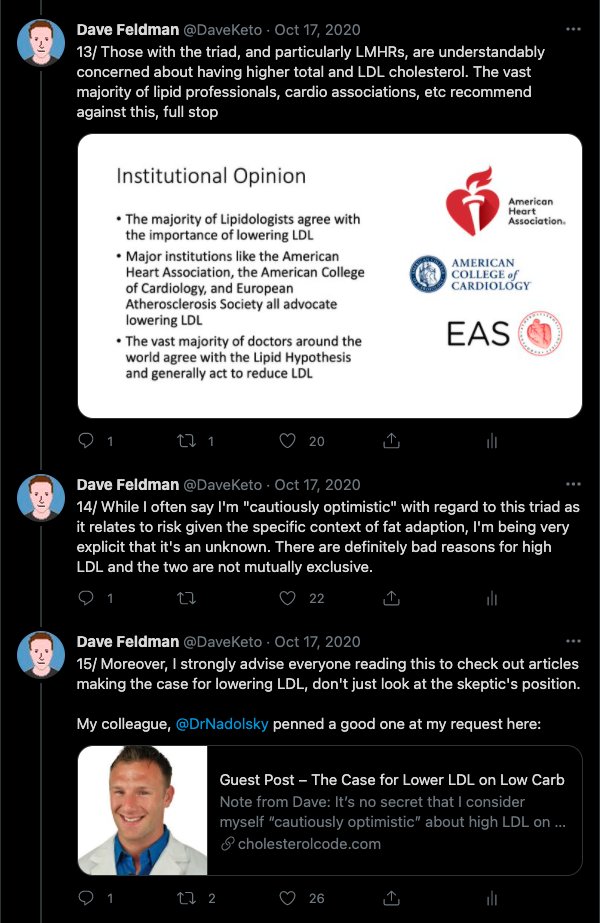
1/ Posting this hypothesis for posterity:
I now suspect #PlantBasedLowCarb (PBLC) isn't as low carb as originally thought.
Before getting started in this thread, I should emphasize I wouldn't consider this a good or bad thing in and of itself, but it is of interest, ofc...
I now suspect #PlantBasedLowCarb (PBLC) isn't as low carb as originally thought.
Before getting started in this thread, I should emphasize I wouldn't consider this a good or bad thing in and of itself, but it is of interest, ofc...

2/ Moreover, I've regularly pointed to people following my work who are both (1) very interested in a low carb diet, but (2) would prefer to keep their #LDL low to consider PBLC as a "third option", as I commonly see it associates with this outcome.
Now to my hypothesis...
Now to my hypothesis...
3/ PBLC generally has two major features separating it from "typical" #keto/#lchf:
1) More fat sourced from mono and polyunsaturated fatty acids (M/PUFA) instead of saturated fatty acids (SFA)
2) A lot more soluble and insoluble fiber via plants
1) More fat sourced from mono and polyunsaturated fatty acids (M/PUFA) instead of saturated fatty acids (SFA)
2) A lot more soluble and insoluble fiber via plants
4/ It's generally assumed one can easily achieve being keto on plant-based given blood levels of beta hydroxybutyrate (BHB), a ketone body, tend to be high on PBLC.
But here's the thing, PUFA is very "ketogenesis-inducing" -- (@KetoCarnivore has a lot of material in this area)
But here's the thing, PUFA is very "ketogenesis-inducing" -- (@KetoCarnivore has a lot of material in this area)
5/ There are a number of studies that explore this, such as this one (though not that ideally): academic.oup.com/jcem/article/8…
But this begs an interesting question...can PUFA being more ketogenic actually mislead us into assuming lower glucose, higher fat use than expected for a diet?
But this begs an interesting question...can PUFA being more ketogenic actually mislead us into assuming lower glucose, higher fat use than expected for a diet?
6/ In other words, can a diet *appear* to be more ketogenic due to the higher use of PUFA in spite of marginally higher carbs?
I think so.
Remember, BHB (like glucose) is a substrate in the blood...
I think so.
Remember, BHB (like glucose) is a substrate in the blood...
7/ Like many substrate blood tests, we are measuring that which is in transit, but not yet in use. We can't know for certain what the actual secretion and/or uptake is.
So we don't truly know how much BHB will correlate strongly with actual fat vs glucose use by cells.
So we don't truly know how much BHB will correlate strongly with actual fat vs glucose use by cells.
8/ Which brings me around to my hypothesis regarding fiber, particularly soluble fiber.
I posit it may appear less glycemic than it is due to a greater use of M/PUFA generating BHB under this PBLC context.
There are two metrics that would help test this...
I posit it may appear less glycemic than it is due to a greater use of M/PUFA generating BHB under this PBLC context.
There are two metrics that would help test this...
9/ The first is Respiratory Exchange Ratio (RER). Never mind resident ketone levels in the blood, looking to the aggregate cell respiration itself will certainly give you a powerful metric of what degree a usage each substrate is providing.
10/ The other is a Continuous Glucose Monitor (CGM), which I likewise believe will show marginal, yet detectable changes in my glucose levels.
I plan to do each of these for my coming fiber-only intervention experiment. Should be fun to see how these results play out.
I plan to do each of these for my coming fiber-only intervention experiment. Should be fun to see how these results play out.
• • •
Missing some Tweet in this thread? You can try to
force a refresh







